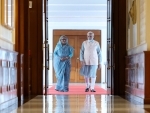Bangladesh
 Bangladesh
Bangladesh Bangladesh is way ahead of Pakistan as an independent nation
One of the key foreign policy issues discussed in Bangladesh currently is the need to fix responsibility on Pakistan for the war crimes committed prior to the 1971 India-Pakistan war. Pakistan does not like it one bit, but it has little choice but to listen today. This is because Bangladesh has today fast outpaced the nation that it was once a part of.
It is this stark reality that is most telling in the narratives of Pakistan and Bangladesh. From a nation labelled as a “basket case” by the then US National Security Adviser Henry Kissinger, Bangladesh has demonstrated that it can move quickly forward and is currently miles ahead of Pakistan.
The Asian Phoenix’s growth rate is today significantly higher than Pakistan, and by May 2021, its foreign exchange reserves had hit a record US$ 45 billion. At that time, Pakistan’s reserves were only US$ 17 billion and today they are US$ 4 billion.
Just how sharp the contrast is can be seen as Bangladesh’s economy has increased by 271 times in the last 50 years, demonstrating a consistent and resilient trajectory of growth.
With an economy focused on the production and export of textiles, Bangladesh has managed to transform its economy. Note that it shared many of the same challenges as Pakistan, such as messy politics, weak public administration, and high corruption.
But Bangladesh focused on its labour-intensive light manufacturing industry, and became the world’s second-largest clothing exporter after China. It is a testament to their innovative approach that Bangladesh, a country that does not grow cotton, has managed to create thousands of garment factories, and which contribute significantly to its US$35 billion in exports.
Notably, Bangladesh left Pakistan behind in all sectors of the economy in 2023-24, theDaily Jang reported, adding that the country presented a budget of US$ 71 billion and a growth rate of 7.5 per cent, whereas Pakistan's growth rate is only 3.5 per cent and inflation cost is 21 per cent!Bangladesh has also outshone Pakistan in population planning.
Despite having a larger population in 1951, Bangladesh through effective population planning campaigns has kept its population at 165 million, compared to Pakistan’s 200 million. More importantly, the share of women in the labour force has consistently grown in Bangladesh, while it has decreased in Pakistan, further showing the divergence in their economic paths.
The state of play in economic terms is as follows, Bangladesh has almost US$ 31 billion in reserves whereas Pakistan has less than US$ 4 billion and, that too, with loans from friendly nations.
(Image and Text Credit: Khalsavox.com)
Bangladesh's exports have reached US$ 52 billion in 52 years since independence whereas Pakistan's exports are still at US$ 31.78 billion.
Bangladesh's export target in the current year is US$ 67 billion while Pakistan's is US$ 38 billion, adding that as per the statistics, Pakistan can provide export and services for only US$ 21.5 billion which is very less than the target.
Pakistan, once a promising post-colonial state, is today a nation mired in political turmoil and economic instability, a legacy of several decades of military rule that deliberately minimised the role of democratic institutions.
Pakistan’s downfall can be attributed to a combination of factors including corrupt leadership, irresponsible fiscal policies, and the deep state’s sponsorship of terrorism. Furthermore, Pakistan’s excessive reliance on domestic and foreign debt, fuelled by overconsumption and import-intensive policies, has led to unsustainable external debt, further weakening its economy.
Geo News recently reported that Pakistan is reeling under one of its worst economic and political crises impacting the masses. Pakistan's Ministry of Finance has warned of challenges originating from uncertain external and domestic economic environments, including higher inflation and external debt repayments, due to lesser foreign exchange inflows.
The ministry, in its monthly outlook bulletin, projected inflation for the month of May to remain in the range e of 34-36 per cent. If one were to pinpoint one single reason for Pakistan’s downfall is its military, which has stripped the country of resources using both legal and illegal means and prevented democracy from developing.
Islamic outfits have made an unliveable environment for religious minorities through targeted killings, abductions, and forced conversions.
Attacks on minorities, especially Sikhs, have become a regular affair in the country and it has triggered tension among communities. Further, Pakistan founded as a theological state uses legal means to keep minorities like the Ahmadis out of the social pale, making their lives in Pakistan miserable.
Bangladesh and Pakistan’s divergent paths highlight the importance of effective leadership, prudent fiscal policies, and a commitment to human development. While Bangladesh has focused on economic growth, improving health, and reducing unemployment, Pakistan’s priorities have been skewed towards regional power struggles, thus ignoring the development of its human capital.From the founding fathers of Bangladesh and more recently, to Prime Minister Sheikh Hasina, there is a lesson that they have learnt and distilled in the country. Keep the Army as far away from politics as possible, otherwise the country will become like Pakistan!
Bangladesh’s journey serves as a reminder to other developing countries struggling to establish a stable and prosperous economy. It shows that with right policies, a country can overcome challenges and transform itself into a global economic powerhouse.In contrast, Pakistan’s story is a cautionary tale, a stark reminder that neglecting human development, promoting irresponsible fiscal policies, and tolerating corruption and religious fundamentalism can lead a country down the path of economic instability and political turmoil. Unless Pakistan changes course, it risks falling further behind not only Bangladesh, but other developing countries as well.



